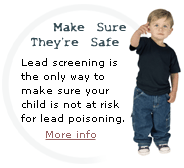 |
The Vermont EMP law requires cleaning of window wells and sills and cleaning after paint is disturbed, but the primary focus of these requirements was to keep children safe that occupy rental housing. A child care provider frequently experiences an environment with more children at the most susceptible ages for extended periods of time than what is typical for most rental housing. For the highest level of safety, a more aggressive approach to cleaning is recommended for child care providers. This should include regular frequent cleaning of other surfaces where lead dust is likely to collect and where children play. While the amount of cleaning required can vary from building to building, the following techniques and schedules should offer a much higher level of safety for children by eliminating lead dust as it collects on various surfaces.
General cleaning techniques
Lead dust may be cleaned by HEPA vacuuming, mopping, or wet-wiping floors and other surfaces where dust may collect in child occupied areas. (Non-HEPA vacuum cleaners and brooms may spread dust to other areas.) Any all-purpose cleaning
product will work and is best used in a spray bottle for misting surfaces. Using paper towels to wipe surfaces after misting with the cleaning solution will put the contamination on something that is thrown away. A sponge or rag and a bucket of cleaning solution will just spread contamination around. Remember to keep the leaning solution out of the reach of children and that some cleaning agents (especially bleach or ammonia) can cause asthmatic reactions in some children. Mist surfaces with the cleaning solution and wipe with paper towels until no visible residue can be seen on the towel. Dispose of soiled paper towels in a sealed plastic garbage bag away from children's access. When mopping, use either a spray bottle and cleaning solution with a single rinse bucket or use a 3 bucket mopping process with bucket of cleaning solution, a bucket for rinse water, and a bucket for wringing. Dispose of mop water down the toilet to avoid contamination of sinks or baths. Do not dump mop water outdoors to avoid contamination of the ground. Wipe mop buckets dry with paper towels before using again. Wear rubber gloves when cleaning or wash hands thoroughly when finished cleaning.
Immediate cleaning
Always clean any visible paint chips in a child-occupied area immediately. Wash dropped
pacifiers and teething rings before allowing children to use them again.
Daily cleaning
Play area floors, toys, toy boxes, pacifiers, tables, and food preparation areas.
Weekly cleaning
Windows, window wells (warm weather), tops of baseboards, non-play area floors, any other trim detail or furniture where dust collects. |


